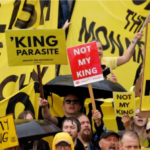From the people that brought you secret courts…please welcome to the stage..secret arrests.
Sounds like the header for a bad comedy doesn’t it? But this latest scandal over Jimmy Tarbuck has proved to be no laughing matter.
Less than a week after UK MPs effectively voted away the right to fair trial in Britain by paving the way for secret courts, it has since emerged that secret arrests are also taking place in this country.
Comedian Jimmy Tarbuck was arrested over alleged sexual offences on April 26, but details of his arrest only came to light on May 7th after journalists learned of the story.
Campaigners say that secret arrests is just another step towards people ‘simply disappearing’.
Liberal Democrat politician and former Scotland Yard officer Brian Paddick, said: “We can’t have the police arresting people and it being kept a secret because it’s a short step to people simply disappearing and no one knowing where they have gone and what’s happened to them.
“It’s a fundamental principle that the openness of the criminal justice system starts when someone is arrested.”
Tarbuck’s is the latest in a long line of arrests stemming from revelations surrounding the conduct of Jimmy Savile in 2011, when hundreds of abuse allegations were made from men and women across the country regarding his conduct towards young children.
Lord Blair said it was in the interests of justice for suspects to be named because the resulting publicity could help uncover vital evidence and encourage more victims to come forward in cases where abuse has taken place.
The Association of Chief Police Officers (Acpo) has revealed their plans to enforce a blanket ban on forces revealing the names of people who have been arrested but not charged.
The move follows one of the recommendations of Lord Justice Leveson in his report on Press standards.
Lawyers and anti-censorship organisations have expressed concern, saying the reporting of those detained by the state is important for ‘trust’ and to prevent ‘secret arrests’.
Kirsty Hughes, of freedom-of-expression campaigners Index on Censorship, told reporters that it is vital to preserve the principle of open justice.
“In certain cases, it may be appropriate to preserve anonymity but a ‘policy’ of secrecy reverses the principle of open justice that we have in the UK,” she added.
Regardless of what an individual has been charged with or whether they turn out to be guilty or innocent, the issue of secret arrests is one which many campaigners and those interested in the fair and open administration of justice have expressed concern about.
In the Justice and Security Bill which was passed by lawmakers last month, MPs voted in a bill which legally bars a suspect from choosing their own defence lawyer and prevents them from hearing all of the evidence against them. The Bill also dictates that a judgment can be made when the suspect is absent and an individual can be tried – without being informed of a case being launched against them. The move was condemned by both lawyers and human rights groups who said that it makes a mockery of the British concept of open justice.
A recent victim of such a court was Wanda Maddocks and her brother, Ivan who were given jail sentences by the Court of Protection after trying to remove their father from a care home where they had expressed concerns over his well-being. The court threatened to raid their family assets if they spoke out about their case.


















Follow Us!